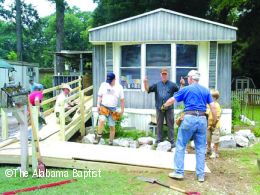Mrs. L lived in the house with the sunken toilet.
She took care of her husband, a hospice patient who was bedridden with cirrhosis of the liver because of alcoholism. Their two granddaughters, abandoned by their mother, who fled after serving a prison sentence, lived with them.
The house, which Mrs. L’s husband had built more than 50 years earlier with untreated lumber, had been mauled by termites. Its only toilet had sunk through the floor, and the cast-iron bathtub was in the process of collapsing. The front porch was too far gone to even support the weight of Mrs. L’s granddaughters; one of them had fallen through the rotten wood.
Frank Burder, founder and president of Hearts in Hands, an independent ministry to hospice patients, arrived one day with a team of volunteers and his family members to fix Mrs. L’s house. Standing next to her husband’s bed, they started to pray, as they do before every project.
“I looked over and Mrs. L said that her husband wanted to pray,” Burder recalled. “He woke up and was reaching out and crying. He couldn’t talk because [he’d] had multiple strokes, but one of my granddaughters held his hand and we prayed that day.”
Burder, a member of The Church at Brook Hills, Birmingham, wasn’t looking to start a ministry like Hearts in Hands when the Lord brought the needs of hospice patients (people who receive care, usually at home, for terminal illnesses) to his attention in 2007.
“This is something I never in my wildest dreams thought I would do,” the retiree said.
That year, he was speaking with a hospice nurse who lamented that she only had time to attend to patients’ health needs and not the other issues they often face. Burder learned that many patients need yard work and home repairs done, which they are often too frail to do themselves. Many live imprisoned in their homes, too immobile to leave and either without family or abandoned by it.
“It was like God was whacking me in the back of the head with a club, saying, ‘Are you [going to] do something?’” Burder said.
The hospice nurse told him of an elderly woman, Miss E, who had simply lost the will to live. Miss E, on oxygen and using a walker, lived alone in a house with no air conditioning or heat. Her trash hadn’t been emptied in months, her dryer didn’t work, her bedsheets hadn’t been changed in a long time and the grass in her yard was 3 feet deep.
Burder and some family members tamed her lawn and fixed what they could inside the house.
“When we left that day, my youngest grandson planted some pansies in a pot and asked her if she wanted to put them outside where they would get some water,” he said. “She said, ‘No,’ that she was looking forward to watering the flowers (herself) because she hadn’t had flowers in awhile. I went home and said to my wife, ‘There are more (people like Miss E) here than we know about.’”
Burder was right. The hospice nurse immediately told him of other patients who needed help, and from that moment, he, members of his family and teams of volunteers have given their weekends for the cause God called them to pursue.
Hearts in Hands learns of needs through connections with eight hospice groups in the state and carries out an average of two projects a month, though Burder hopes to do more. The work varies from building wheelchair ramps to roofing to yard care. More recently, it has included simply visiting with hospice patients, many of whom, Burder said, are utterly starving for conversation.
“When they’re shut in for medical reasons, it’s like the rest of the world is shut out,” he said. “That’s not the way it should happen. Because they’re shut in, we should not be shut out.”
Burder only uses volunteers from churches near patients, because one of his goals is to connect (or reconnect) patients to local churches, where they can receive more consistent support and companionship.
It’s a goal Lance Lee, chaplain and volunteer coordinator with Family Comfort Hospice, agreed is important. He said he encounters hospice patients who are either not Christians or never were connected to a church and local churches will have to actively reach out to them.
“Because of their illness … they’re not able to physically come to church, so the church must come to them,” Lee said.
Steve Roberson and other volunteers from Catalyst, the nondenominational men’s ministry he leads, have worked with Hearts in Hands on three wheelchair ramps in their area.
“One thing I’ve found is that the need is much greater than I ever really realized,” Roberson said. “Until you start looking, you don’t know.”
He said ministries like Hearts in Hands are important ways for believers to show with actions that they love God as they say they do.
“Needs don’t just always look clean, like putting a check in the offering plate and that’s the end of it,” Roberson added. “Sometimes you have to get right down there in it.”
Burder said the ministry has a crucial need for more funds and volunteers but he has confidence that God will continue to provide everything needed.
Much more than any needs Hearts in Hands may have, Burder speaks of the joy he feels in doing God’s work and seeing hope return to people who had all but given up.
“You know when you see this patient smiling at you, and they haven’t smiled in six months, they’re smiling because they see God in you, and that’s what we’re supposed to be.”
For more information, visit www.heartsinhands.org.






Share with others: